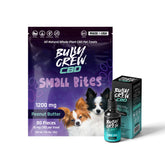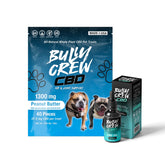Reishi mushrooms, scientifically known as Ganoderma Lucidum, have a long history of use in traditional medicine due to their potential health benefits. Often called the mushroom of longevity, they benefit humans, and reishi mushroom dogs offer significant advantages that potentially improve their overall health and well-being.
In this article, we will dive deep into the intricate world of Reishi mushrooms for dogs. We'll cover essential information, including proper dosage, possible side effects, and the health benefits your dog might experience from this remarkable mushroom. If you are wondering can dogs have reishi mushrooms or simply curious about its effects, read on to learn more about how this ancient remedy can support your dog's well-being.
What Are Reishi Mushrooms?
The reishi mushroom, known scientifically as Ganoderma lucidum and referred to as Lingzhi in Chinese, is a fascinating fungus with a distinctive reddish-brown, fan-shaped appearance.
Reishi often called the mushroom of immortality, has been a cornerstone of Traditional Chinese Medicine for thousands of years. This remarkable mushroom is celebrated for its health and longevity benefits and is widely used in China, Japan, and Korea.
In traditional Chinese medicine, Reishi is believed to positively influence the heart, Lung, liver, and kidney channels. Practitioners often prescribe it to balance Qi, the body's vital life force, and to calm the mind. Additionally, Reishi is known for its ability to relieve respiratory conditions such as coughs and asthma.
Reishi's reputation for supporting overall health has made it a revered symbol in Chinese culture. Its image frequently appears in art, literature, and architecture, highlighting its esteemed status and the deep respect for its health-promoting properties.
The Compounds That Make Reishi Beneficial
Reishi mushrooms contain over 400 bioactive compounds, such as triterpenoids, polysaccharides like beta-glucans, nucleosides, sterols, steroids, fatty acids, proteins, peptides, and trace elements.
Many of these compounds are secondary metabolites naturally made by bacteria, fungi, and plants. Unlike primary metabolites essential for growth, secondary metabolites are not necessary for development but can be used to create drugs.
For example, Taxol, an antitumor drug, is derived from plant secondary metabolites. These compounds send complex messages to cells, much like how a larger alphabet allows for more words and sentences to be formed.
Triterpene
Reishi mushrooms contain a compound called ganoderic acid, a triterpene known for its health benefits, including antitumor, antimicrobial, anti-malaria, liver protection, and blood pressure reduction. Reishi has many triterpenes, each offering unique benefits and working together with beta-glucans in the mushroom. However, these triterpenes give Reishi its notably bitter taste, which can be off-putting to pets, as animals tend to avoid bitter flavors. Later in this blog, we'll explore ways to mask this bitterness to make reishi mushroom for dogs.
What Reishi for dogs Do
Reishi mushroom benefits are well-researched and offer several health benefits:
- Boost immune system
- Reduce inflammation
- Provide antioxidant support
- Protect the liver
- Support kidney health
- Help with allergy relief
- Aid in blood sugar control
- Help regulate blood pressure
Reishi mushroom benefits for dogs
1. Fights Cancer
Reishi mushrooms have been used for centuries in China and Japan to fight cancer. These mushrooms are packed with triterpenes, which offer a range of health benefits. Research from Peking University and the University of Macao highlights their anti-cancer properties, revealing that reishi mushrooms contain beta-glucans—complex sugars that help regulate the immune system. This means they can enhance immune response without causing overstimulation. Studies suggest that reishi mushrooms not only help the immune system battle cancer but might also prevent it from developing or spreading. Additionally, research from the University of Chicago indicates that reishi mushrooms can reduce chemotherapy-related nausea and vomiting in rats.
2. Protects Liver
A healthy liver is essential for your dog's overall well-being. To support your dog's liver, consider adding foods or supplements that boost liver health. Reishi mushrooms are a great choice because they have antioxidant properties that nourish, detoxify, and protect the liver. These antioxidants fight free radicals that can impair liver function, helping to renew liver cells and enhance the detoxification process.
Research from Taiwan's China Medical University found that reishi mushrooms were effective in reversing liver fibrosis in rats, a severe stage of liver disease often deemed untreatable. While liver fibrosis, hepatitis B, and cirrhosis are not conditions typically found in dogs, these findings highlight the powerful healing potential of reishi mushrooms.
3. Manages Diabetes
Research indicates that reishi mushrooms can be beneficial for managing diabetes. Studies from two Taiwanese universities have found that reishi mushrooms can help lower blood sugar and regulate glucose levels. Additionally, research from Peking University Health Science Center shows that Reishi may prevent or slow kidney problems often associated with diabetes. For diabetic patients, Reishi's polysaccharides can also aid in faster wound healing. If your dog is on diabetes medication, consider discussing with your holistic vet whether Reishi could be a helpful supplement.
4. Supports Heart Health
Reishi mushrooms have been used for centuries in Asian medicine to support heart health, even though modern clinical trials are still lacking. In Japan, they're a traditional remedy for circulatory issues, and in Chinese medicine, they're known as a general tonic for the cardiovascular system. Studies, including one with angina patients in Indonesia, show that the antioxidants in reishi mushrooms help combat atherosclerosis, a condition that affects the arteries. Reishi mushrooms work as vasodilators, meaning they help widen blood vessels, which improves blood flow and reduces the heart's workload. They may also thin the blood and lower blood pressure, potentially easing heart arrhythmias. However, if you're on blood thinners like warfarin, it's important to avoid Reishi due to its blood-thinning effects.
5. Control Allergies
Reishi mushrooms are a natural remedy for allergies thanks to their unique compounds. They contain ganoderic acid and oleic acid, both of which help to control allergic reactions by inhibiting histamine release. Histamines are the chemicals that trigger allergy symptoms like itching and breathing problems. Reishi mushrooms also have powerful antioxidant and anti-inflammatory properties, which can further help reduce these uncomfortable symptoms and support overall immune health.
6. Slow Aging
Reishi mushrooms, often called the mushroom of immortality, are renowned for their ability to combat the signs of aging. Studies from several Chinese universities have shown that reishi mushrooms work their magic through powerful antioxidant and anti-inflammatory effects, boosting the immune system and supporting brain health. This makes them a great ally in managing age-related issues like cognitive decline and arthritis. Their unique properties can help delay aging and enhance overall wellness of your pet.
Side Effects of Reishi Mushroom
Reishi mushrooms for dogs are generally safe with minimal side effects. In rare cases, people might experience nausea or trouble sleeping. For dogs, it's best to introduce reishi mushrooms gradually to prevent any digestive issues. It's important to note that reishi mushrooms have anti-clotting properties, so they shouldn't be used alongside blood-thinning medications. Also, avoid giving reishi mushrooms to pregnant or nursing animals, as there isn't enough research on their effects in these cases.
How To Give Reishi Mushrooms To Your Dog
Can dogs eat reishi mushrooms directly? Reishi mushroom for dogs are known for their health benefits, but they come with a notably bitter taste. Because of this strong flavor, giving them to your dog can be a bit tricky. The most effective way to incorporate Reishi mushrooms into your dog's diet is by using them in a tincture or powder/capsule form. These formats mask the bitterness and make it easier to mix the mushrooms into your pet's food, ensuring they get all the benefits without the unpleasant taste.
Buying Reishi
When choosing mushroom supplements, quality can vary significantly, so it's crucial to do your homework before making a purchase. Look for organic products whenever possible, and don't hesitate to inquire about how the mushrooms are cultivated. Many supplements are made from mycelium, a part of the fungus that's grown on grain. This mycelium isn't a full mushroom and tends to be high in starch while lacking the complete levels of beta-glucan, a key medicinal component known for its cancer-fighting and immune-boosting properties. Hence, reishi mycelium benefits are limited.
Additionally, Reishi mushrooms for dogs are often combined with other types like Maitake, Shiitake, Cordyceps, or Turkey Tail in supplements. These blends can offer a more comprehensive range of benefits, enhancing the overall effectiveness of the supplement.
You may like:







